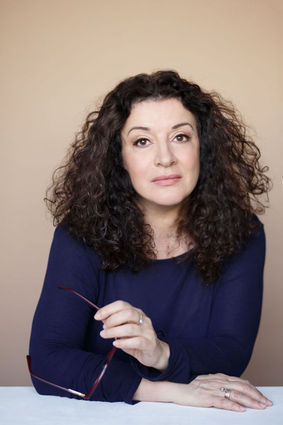'Jewish Soul Food' author Janna Gur wants to make vegetables 'sexy'
NEW YORK (JTA)-Janna Gur's "The Book of New Israeli Food" has sat on my kitchen counter with my other favorite cookbooks for years, and I frequently pull it out for friends and family who are unfamiliar with Israeli cuisine, saying, "This is the book you need to buy to understand food in Israel."
Gur's newly published sequel, "Jewish Soul Food: From Minsk to Marrakesh" (Random House), is even more beautiful than its predecessor and more accessible to an American audience.
While in New York on a book tour, Gur took time out to chat with me at a Manhattan cafe. (The interview has been condensed and edited.)
JTA: How did you become a cookbook author?
Gur: I got into this business by accident 22 years ago when my husband was working on a marine sports magazine, and I became very interested in the layout, editing and general production of putting out a magazine. We decided to expand the business together, and it was at that point we started Al Hashulchan (On the Table) magazine. It was originally intended as a trade magazine for chefs and caterers but quickly became popular with amateur foodies and home cooks.
Within a few months, food became my life. When we decided to work on an Israeli cookbook, I didn't imagine myself actually writing it but thought I would just edit it. In the end, though, I couldn't find someone who would carry out my vision, so I decided to write it myself.
What was your vision?
I wanted to tell the story of what happened in Israel food-wise over the last two decades. I wanted to talk about the markets, holidays, Shabbat, olive oil, wine. And I wanted to juxtapose traditional recipes with modern takes on them from Israeli chefs.
Israeli food is certainly having its moment-why do you think this is happening now?
I think the question of timing has been very important in this. In some ways, my first book was a bit premature. But now [restaurateur and cookbook author Yotam] Ottolenghi has really done more to promote Israeli cuisine than all the tourism efforts combined.
We are still in the middle of a revolution, just the second stage. If the first phase started in the 1990s, then we now have an entire generation of Israelis in their 20s and 30s who are foodies in a different way. They take great food for granted. For example, my daughter, even if she is on a budget, has to buy great bread, has to buy high-quality goat cheese and has to raid our wine supply when she comes to visit.

We do that to my in-laws, too. Glad to see stealing good wine from your parents transcends the Israeli-Diaspora line.
Yes, exactly. Like Americans, younger Israelis want to feel connected to authentic food. It's less about gourmet experiences. Young people are opening smaller food establishments, less expensive. We are part of a global food phenomenon and also uniquely Israeli.
What gets you excited about food in Israel currently?
A good example is what Eyal Shani is doing at his restaurant Miznon in Tel Aviv. He is probably the most talented chef in Israel currently. We recently had these pitas there that were stuffed with liver, beef stew, baked potato-all different, exciting fillings. It's not Israeli fusion food; it's Israeli food that is local and elevated.

Did you have any formal food training for your work?
No, because I didn't need training. I am not a chef and I never pretend to be one. I don't think most food editors were trained as chefs. By the very fact I had to go through so many recipes, texts and books-in the end you just amass a lot of knowledge. As I got interested in food, I got more and more interested in cooking and started cooking more myself. But even now I don't regard myself as a cook; I am a food person.
What inspired you to write "Jewish Soul Food"?
I came to the realization that there is a whole world of Jewish dishes that are on the verge of extinction, and the only place they all still exist is in Israel.
If you are Italian and want to connect with your culinary roots, it is easy: You hop on a plane and go to northern Italy or southern Italy and eat. If you are an Iraqi Jew and want to connect with your culinary roots, there is nowhere to go. At least not back to Iraq.
I wanted to preserve these recipes, and the only way is to cook them and make people want to eat them. So I wanted this collection of recipes to be dishes that are worth preserving and delicious. And not overly complicated.
When you are in New York, what do you love to eat? And what do you miss about Israeli food?
I love that you can have anything! Just the other day my husband and I stumbled upon a Vietnamese restaurant in Chinatown that was fantastic. There is such a variety of foods. You can wake up in the morning and say today I want Mexican, and you have 50 choices.
What I miss is sort of obvious: I miss my salad and lighter, more colorful food. You can find this in New York City, but you have to look for it. In Israel I can go anywhere-right in my own neighborhood-to eat this way.
What do you hope Americans will take away from the way Israelis eat?
I want Americans to learn from the way Israelis treat vegetables. We know how to make vegetable sexy. For us, vegetables are not a punishment, they are something exciting.
Shannon Sarna writes "The Nosher" blog on MyJewishLearning.




Reader Comments(0)